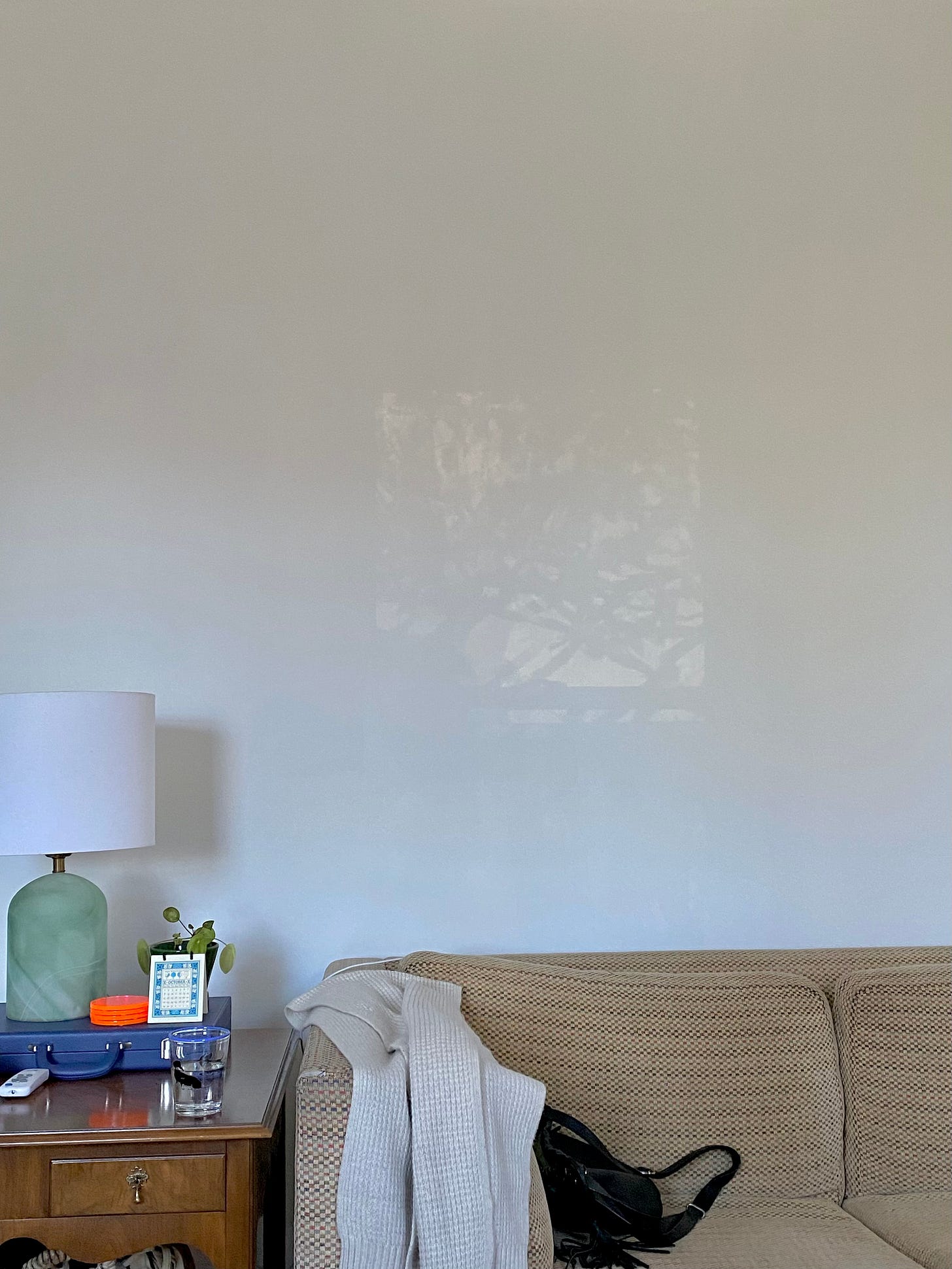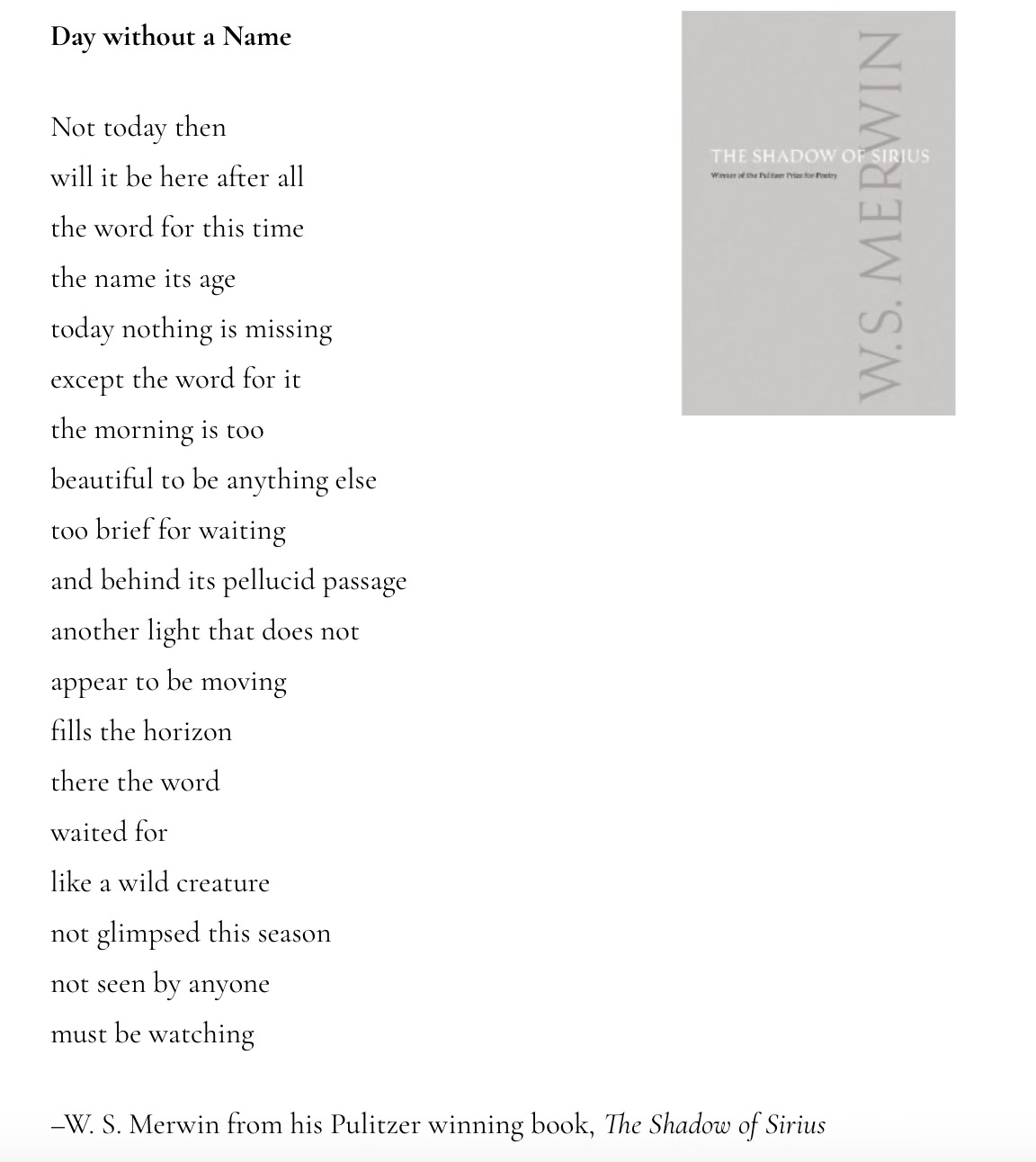The Words I Have and Those I Don't
An encounter with God and the poetry of W.S. Merwin
I’ve been thinking too much when I should be writing. I had an encounter with God last week, and instead of immediately writing about it, I’ve just been thinking about it a lot. Thinking is no good because it changes everything. I took a class in college—a German in translation class on the mysteries of memory. Proust, Nabakov, Duras. I learned that every time we remember something, we get further and further from the truth of the remembered event. Eventually we remember things, wholeheartedly, that never really happened. It’s a bit disturbing, but also inspiring, as far as the power of the human mind goes. What is truth anyway?
I’m not being dramatic when I say that I encountered God. He came to my apartment on a Monday morning. Almost afternoon. It was 11:52, and I was sitting at the table in front of my clunky, heaving work computer. I was working from home—a rarity—because my bookshelves were being installed by a kind bald man The Container Store sent to me. It was un-quiet, so I was thinking about how Lee and Michael—my downstairs neighbors who leave me semi-regular notes to say that they appreciate my efforts to minimize unnecessary noise, but it really sounds like I’m stomping—were probably having dual aneurisms beneath my floorboards. My wood floor is their ceiling, as they like to remind me.
I don’t remember exactly how it happened—whether I noticed it out of the corner of my eye, or looked away from my computer by chance, or something else. Regardless, I looked up at the still-bare wall in front of me to see a near perfect square of light and shadow projected there. It shocked me. What was this? The tree outside my window with its lightened load of fall leaves was dancing on my wall in a gentle breeze. Bare wall no more.
I wish I could pretend that I don’t live in the modern world, but it’s not true. After sitting dumbstruck for a moment—maybe 20 seconds, really—I picked up my phone and took a picture, then a video. I sent the video to my lover, to let him know that the world was beautiful, even on a Monday. When I looked back up, my shadow box was gone. Just like that. It couldn’t have been there for more than a minute. And it was then that I realized I had seen God.
It is in moments like this one that I most understand the frequent writer’s lament—the insufficiency of words, our only tool. How can I tell you what I felt in that moment? Had it not been for the kind bald man, I would have issued forth a guttural shout, and sobbed, and touched the wall with my fingertips. As it was, I didn’t want to frighten him, so I sat stock still, mouth agape, staring at that plain white wall, phone forgotten in my hand. I remembered to breathe; I laughed quietly. I felt comforted by the miracle of it all, and I shed two tears, one from each eye. How could I not surrender at least in that small way, to the force which filled me?
Only later did it occur to me that my windows are east-facing, and at 11:52am, the sun would not be anywhere in the sky to project that kind of shadow. It makes me feel like I have something in my throat that needs to get out, even now, recounting it. That lump I often feel, half sickness, half ecstasy must be, can only be, the words.
It makes me think of M.S. Merwin, who wrote extensively about the search for words—the word that would be the experience itself instead of just approximating it. The word that could bridge the gap between life and expression. It’s something we don’t think about very often, the total inadequacy of language, but when we do, or at least when I do, it is staggering to consider. It is heartwarming too, our valiant fight, our doing-the-best-we-can, our persistence in the face of near certain defeat.
One of the Merwin poems I think of frequently is “The Unwritten,” from his 1973 collection, Writings to an Unfinished Accompaniment. His frustration and bewilderment as he calls the reader to imagine “words that have never been written / never been spoken / never been taught” crouching and hiding inside the pencil in his hand. He imagines them spiteful, awake in the dark pencil core, hearing us call to them, refusing to come out—“not for love not for time not for fire / even when the dark has worn away” they will refuse to come. They will actively refuse us!
He wonders—would there, could there, even be a language that would allow him to recognize it, “to make out the real names / of everything”? The original language that God gave to Adam is gone forever—dashed away with the Tower of Babel. Perhaps what was lost with Babel wasn’t just our ability to understand each other, but language’s very ability to express human experience—not just to approximate it, but to be it. If the goal of language is to be the essence of the thing it describes, then in pushing that theory to the limits, there should be a single word that can accomplish that task, encapsulating not just one feeling or thing, but rather the entire condition of being alive. Maybe that one word, “and it’s all we need / it’s here in this pencil / every pencil in the world / is like this”.
So do we settle on frustration or acceptance. Are we angry at the word for hiding in the pencil, or are we honored just to be able to hold the pencil in the first place. Maybe we are proud to hold the pencil, as Merwin suggests in “The Old Boast” from the same collection. Three lines only:
Listen natives of a dry place
from the harpist’s fingers
rain
If the natives of the dry place are us, parched and thirsting for something beyond our reach, the harpist is the poet, and the rain his words. So, listen. Soak it up. Consider—can the words really be that ultimate salve? The answer to our questions? Merwin seems to say yes—yes, because we there is no other medicine to take, the only hope we have lies in the words. Simultaneously, he acknowledges that to claim these things is nothing more than a boast. He knows better than to believe it all the way, he is self-aware enough to know how short he falls. Even the most talented harpist falls short. The words fall short.
So how can we find peace living in this paradoxical state? Where words are everything and nothing all at once. The most important tool we possess, powerful to a point, but woefully inadequate still. I give you, “Day Without a Name” from his 2009 Pulitzer Prize winning collection, The Shadow of Sirius.
“today nothing is missing / except the word for it / the morning is too / beautiful to be anything else”
The peace comes from accepting that, no, the word will not come today, not yesterday and probably not tomorrow either. Don’t wait for it! Live in the moment—a platitude, but one of the good ones. Have reverence for the word—the one perfect word—it is a “wild creature” that you cannot tame, “not glimpsed this season / not seen by anyone,” but watching somewhere off at the horizon. Consider perhaps, that this wild, unruly thing is too wild and too unruly. Perhaps if you saw it written or heard it said, you would issue forth a guttural shout and sob and touch your finger tips to the world, and how would you ever stop, if that word on the paper or sounding through the air wasn’t just an approximation? How could you ever stop if the word was the real thing?
The world is beautiful on a Monday morning. Too beautiful for any words I have at my disposal and too beautiful for me not to try using them anyway. So I use them, and am surprised to find that they can get quite close. I push them closer still, content to roll this boulder up this hill.
This is the collection of W.S. Merwin’s poetry that I own. It’s very good, but it doesn’t include his later poetry—like “Day Without a Name.” This one appears to be more recent, and is probably very good too, edited by Merwin’s long-time editor.




Wow, how incredible! Such a perfect (PERFECT) reflection I can’t quite believe it. I’m so glad you savoured it first but still managed to get a photo - the best of both worlds honestly. And thoughts and prayers for Lee and Michael whilst your bookshelves were getting fitted - a very hard day for them I’m sure x
Absolutely awe-inspiring!! I am not a writer, and just barely an articulater (not a word?), and this acknowledges so many unspoken pockets in my happy, grateful existence. Heart heart kiss hug squeeze love you